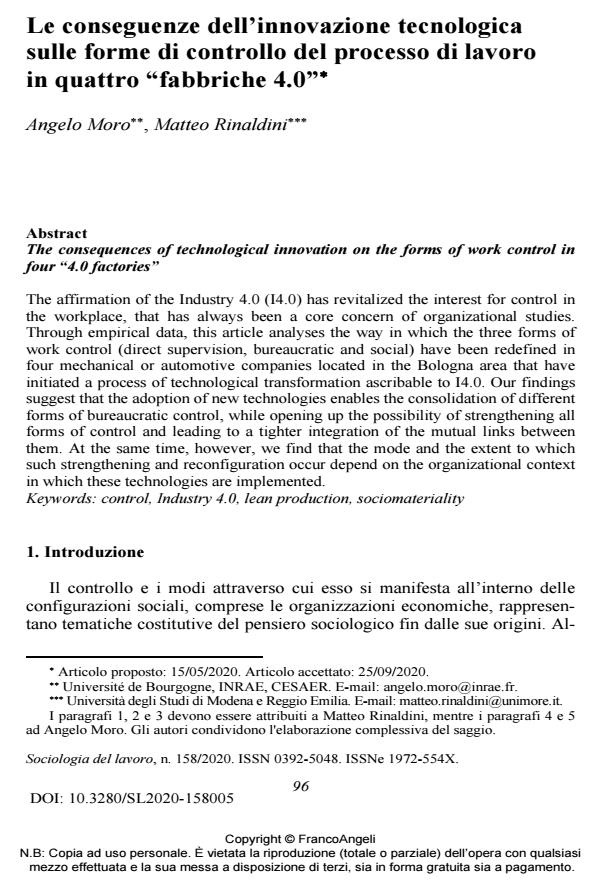Le conseguenze dell’innovazione tecnologica sulle forme di controllo del processo di lavoro in quattro "fabbriche 4.0"
Titolo Rivista SOCIOLOGIA DEL LAVORO
Autori/Curatori Angelo Moro, Matteo Rinaldini
Anno di pubblicazione 2020 Fascicolo 2020/158
Lingua Italiano Numero pagine 22 P. 96-117 Dimensione file 299 KB
DOI 10.3280/SL2020-158005
Il DOI è il codice a barre della proprietà intellettuale: per saperne di più
clicca qui
Qui sotto puoi vedere in anteprima la prima pagina di questo articolo.
Se questo articolo ti interessa, lo puoi acquistare (e scaricare in formato pdf) seguendo le facili indicazioni per acquistare il download credit. Acquista Download Credits per scaricare questo Articolo in formato PDF

FrancoAngeli è membro della Publishers International Linking Association, Inc (PILA)associazione indipendente e non profit per facilitare (attraverso i servizi tecnologici implementati da CrossRef.org) l’accesso degli studiosi ai contenuti digitali nelle pubblicazioni professionali e scientifiche
L’affermazione di Industria 4.0 (I4.0) ha rivitalizzato l’interesse, da sempre centrale per gli studi organizzativi, per il controllo nei luoghi di lavoro. Il presente contributo analizza, attraverso evidenza empirica, il modo in cui le tre forme di controllo del lavoro (a supervisione diretta, burocratico e sociale) si manifestano in quattro imprese metalmeccaniche del territorio bolognese che hanno avviato un processo di trasformazione tecnologica riconducibile a I4.0. I risultati della ricerca suggeriscono che l’adozione delle nuove tecnologie permette il consolidamento delle forme di controllo burocratico, aprendo al contempo alla possibilità di rafforzare tutte le forme di controllo e di riconfigurare, attraverso una più stretta integrazione, la loro relazione reciproca. In ultima istanza, tuttavia, il tipo e la misura del rafforzamento e della riconfigurazione delle forme di controllo dipendono dal contesto organizzativo in cui tali tecnologie sono implementate.
Parole chiave:Controllo, Industria 4.0, lean production, sociomaterialità
- Industrial democracy between neocapitalism and postfordism. The political and intellectual trajectory of Bruno Trentin (1926-2007) Francesco S. Massimo, in STUDI ORGANIZZATIVI 2/2024 pp.27
DOI: 10.3280/SO2023-002002 - La classe operaia va nel cyberspazio. Il capitalismo di piattaforma oltre i miti della digitalizzazione Marco Marrone, Gianmarco Peterlongo, Giorgio Pirina, in ECONOMIA E SOCIETÀ REGIONALE 1/2021 pp.127
DOI: 10.3280/ES2021-001011
Angelo Moro, Matteo Rinaldini, Le conseguenze dell’innovazione tecnologica sulle forme di controllo del processo di lavoro in quattro "fabbriche 4.0" in "SOCIOLOGIA DEL LAVORO " 158/2020, pp 96-117, DOI: 10.3280/SL2020-158005